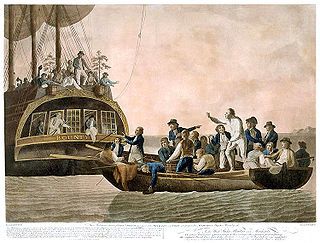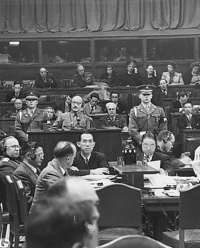This is your morning Open Thread. Pour your favorite beverage and review the past and comment on the future.
Find the past “On This Day in History” here.
April 28 is the 118th day of the year (119th in leap years) in the Gregorian calendar. There are 247 days remaining until the end of the year.
On this day, two events occurred involving the South Pacific. Separated by 158 years, one was a mutiny, the other a grand adventure.
 Apr 28, 1789: Mutiny on the HMS Bounty Mutiny on the Bounty: The mutiny was led by Fletcher Christian against the commanding officer, William Bligh. The sailors were attracted to the idyllic life on the Pacific island, and repelled by the alleged cruelty of their captain. Captain Bligh and 18 sailors were set a drift in the South Pacific, near the island of Tonga. Christian along with some of the mutineers and native Tahitians eventually settled on Pitcairn Island an uninhabited volcanic island about 1000 miles south of Tahiti. The mutineers who remained behind on Tahiti were eventually arrested and returned to England where three were hanged. The British never found Christian and the others. Captain Bligh and the 18 others eventually arrived in Timor.
Apr 28, 1789: Mutiny on the HMS Bounty Mutiny on the Bounty: The mutiny was led by Fletcher Christian against the commanding officer, William Bligh. The sailors were attracted to the idyllic life on the Pacific island, and repelled by the alleged cruelty of their captain. Captain Bligh and 18 sailors were set a drift in the South Pacific, near the island of Tonga. Christian along with some of the mutineers and native Tahitians eventually settled on Pitcairn Island an uninhabited volcanic island about 1000 miles south of Tahiti. The mutineers who remained behind on Tahiti were eventually arrested and returned to England where three were hanged. The British never found Christian and the others. Captain Bligh and the 18 others eventually arrived in Timor.
Years later on 1808. am American whaling vessel discovered the colony of women and children led by the sole surviving mutineer, John Adams. The Bounty had been stripped and burned. Christian and the other 8 mutineers were dead. Adams was eventually granted amnesty and remained the patriarch of Pitcairn Island until his death in 1829.
 1947 Thor Heyerdahl and five crew mates set out from Peru on the Kon-Tiki to prove that Peruvian natives could have settled Polynesia. His crew of six fellow Norwegians set sail from Peru on a raft constructed from balsa logs and other materials that were indigenous to the region at the time of the Spanish Conquistadors. After 101 days crossing over 400 miles they crashed into a reef at Raroia in the Tuamotu Islands on August 7, 1947. Heyerdahl’s book, “The Kon-Tiki Expedition: By Raft Across the South Seas”, became a best seller, the documentary won an Academy Award in 1951. The original raft is on display in the Kon-Tiki Museum in Oslo. Heyerdahl died April 18, 2002 in Italy.
1947 Thor Heyerdahl and five crew mates set out from Peru on the Kon-Tiki to prove that Peruvian natives could have settled Polynesia. His crew of six fellow Norwegians set sail from Peru on a raft constructed from balsa logs and other materials that were indigenous to the region at the time of the Spanish Conquistadors. After 101 days crossing over 400 miles they crashed into a reef at Raroia in the Tuamotu Islands on August 7, 1947. Heyerdahl’s book, “The Kon-Tiki Expedition: By Raft Across the South Seas”, became a best seller, the documentary won an Academy Award in 1951. The original raft is on display in the Kon-Tiki Museum in Oslo. Heyerdahl died April 18, 2002 in Italy.
1192 – Assassination of Conrad of Montferrat (Conrad I), King of Jerusalem, in Tyre, two days after his title to the throne is confirmed by election. The killing is carried out by Hashshashin.
1253 – Nichiren, a Japanese Buddhist monk, propounds Nam Myoho Renge Kyo for the very first time and declares it to be the essence of Buddhism, in effect founding Nichiren Buddhism.
1503 – The Battle of Cerignola is fought. It is noted as the first battle in history won by small arms fire using gunpowder.
1611 – Establishment of the Pontifical and Royal University of Santo Tomas, The Catholic University of the Philippines, the largest Catholic university in the world.
1788 – Maryland becomes the seventh state to ratify the Constitution of the United States.
1789 – Mutiny on the Bounty: Lieutenant William Bligh and 18 sailors are set adrift and the rebel crew returns to Tahiti briefly and then sets sail for Pitcairn Island.
1792 – France invades the Austrian Netherlands (present day Belgium), beginning the French Revolutionary War.
1796 – The Armistice of Cherasco is signed by Napoleon Bonaparte and Vittorio Amedeo III, the King of Sardinia, expanding French territory along the Mediterranean coast.
1869 – Chinese and Irish laborers for the Central Pacific Railroad working on the First Transcontinental Railroad lay 10 miles of track in one day, a feat which has never been matched.
1887 – A week after being arrested by the Prussian Secret Police, Alsatian police inspector Guillaume Schnaebelé is released on order of German Emperor William I, defusing a possible war.
1920 – Azerbaijan is added to the Soviet Union.
1930 – The first night game in organized baseball history takes place in Independence, Kansas.
1932 – A vaccine for yellow fever is announced for use on humans.
1944 – World War II: Nine German S-boots attacked US and UK units during Exercise Tiger, the rehearsal for the Normandy landings, killing 946.
1945 – Benito Mussolini and his mistress Clara Petacci are executed by a firing squad consisting of members of the Italian resistance movement.
1947 – Thor Heyerdahl and five crew mates set out from Peru on the Kon-Tiki to prove that Peruvian natives could have settled Polynesia.
1949 – Former First Lady of the Philippines Aurora Quezon, 61, is assassinated while en route to dedicate a hospital in memory of her late husband; her daughter and 10 others are also killed.
1950 – Bhumibol Adulyadej marries Queen Sirikit after their quiet engagement in Lausanne, Switzerland on July 19, 1949.
1952 – Dwight D. Eisenhower resigns as Supreme Allied Commander of NATO.
1952 – Occupied Japan: The United States occupation of Japan ends as the Treaty of San Francisco, ratified September 8, 1951, comes into force.
1952 – The Sino-Japanese Peace Treaty (Treaty of Taipei) is signed in Taipei, Taiwan between Japan and the Republic of China to officially end the Second Sino-Japanese War.
1965 – United States occupation of the Dominican Republic: American troops land in the Dominican Republic to “forestall establishment of a Communist dictatorship” and to evacuate U.S. Army troops.
1969 – Charles de Gaulle resigns as President of France.
1970 – Vietnam War: U.S. President Richard M. Nixon formally authorizes American combat troops to fight communist sanctuaries in Cambodia.
1975 – General Cao Van Vien, chief of the South Vietnamese military, departs for the US as the North Vietnamese Army closed in on victory.
1977 – The Red Army Faction trial ends, with Andreas Baader, Gudrun Ensslin and Jan-Carl Raspe found guilty of four counts of murder and more than 30 counts of attempted murder.
1977 – The Budapest Treaty on the International Recognition of the Deposit of Microorganisms for the Purposes of Patent Procedure is signed.
1978 – President of Afghanistan, Mohammed Daoud Khan, is overthrown and assassinated in a coup led by pro-communist rebels.
1986 – The United States Navy aircraft carrier USS Enterprise becomes the first nuclear-powered aircraft carrier to transit the Suez Canal, navigating from the Red Sea to the Mediterranean Sea to relieve the USS Coral Sea.
1987 – American engineer Ben Linder is killed in an ambush by U.S.-funded Contras in northern Nicaragua.
1988 – Near Maui, Hawaii, flight attendant Clarabelle “C.B.” Lansing is blown out of Aloha Airlines Flight 243, a Boeing 737, and falls to her death when part of the plane’s fuselage rips open in mid-flight.
1994 – Former Central Intelligence Agency counter-intelligence officer and analyst Aldrich Ames pleads guilty to giving U.S. secrets to the Soviet Union and later Russia.
1996 – Whitewater controversy: President Bill Clinton gives a 4 1/2 hour videotaped testimony for the defense.
1996 – In Tasmania, Australia, Martin Bryant goes on a shooting spree, killing 35 people and seriously injuring 21 more.
2001 – Millionaire Dennis Tito becomes the world’s first space tourist.
2008 – A train collision in Shandong, China, kills 72 people and injures 416 more.
Holidays and observances
* Christian Feast Day:
Louis de Montfort
Peter Chanel
Vitalis and Valeria of Milan
April 28 (Eastern Orthodox liturgics)
* Feast of Jamal (“Beauty”), the first day of the third month of the Baha’i calendar. (Baha’i Faith)
* National Day of Mourning, to commemorate workers killed, injured, or suffering illness from occupational hazards and accidents. (Canada)
Workers Memorial Day (International)
World Day for Safety and Health at Work (International)
* National Heroes Day (Barbados)
* National Day (Sardinia)
* The first day of the Floralia, in honor of Flora. (Roman Empire)

 Severe storms have swept across the Midwest and Southern United States that have killed over 300 people as massive tornadoes swept through the region. It isn’t just tornadoes that are causing the devastation but the heavy rains have caused flooding that is wiping out entire towns as levees along the Mississippi and Missouri Rivers fail.
Severe storms have swept across the Midwest and Southern United States that have killed over 300 people as massive tornadoes swept through the region. It isn’t just tornadoes that are causing the devastation but the heavy rains have caused flooding that is wiping out entire towns as levees along the Mississippi and Missouri Rivers fail.
 Federal Reserve chairman Ben Bernanke held a first ever news conference after the central bank’s meeting of Federal Open Market Committee which determines interest rates. His statement and the Q&A after were really boring as Bernanke droned in a monotone voice and filibustered questions. It took a bit, as
Federal Reserve chairman Ben Bernanke held a first ever news conference after the central bank’s meeting of Federal Open Market Committee which determines interest rates. His statement and the Q&A after were really boring as Bernanke droned in a monotone voice and filibustered questions. It took a bit, as 
 1947 Thor Heyerdahl and five crew mates set out from Peru on the
1947 Thor Heyerdahl and five crew mates set out from Peru on the
Recent Comments